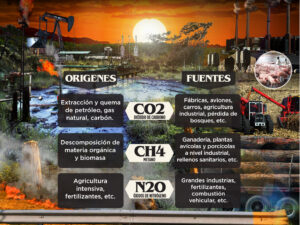Acción Ecológica files climate change lawsuit in Ecuador

On International Human Rights Day, Acción Ecológica, KAIROS partner organization in Ecuador, and a consortium of organizations and groups filed a lawsuit before the Ecuadorian state. The lawsuit claims that the oil refinement process contributes to climate change, which has local and global consequences. In particular, the lawsuit denounces Chinese transnational oil companies for their negative impact in Waorani communities in the Amazon rainforest of Ecuador.
Pego Enomenga, an elder from the Miwaguno community, recalls: “Before, the rivers didn’t grow that much. They were full but not overflowing. Now the water covers the crops. There is a lot of water. Before there was no damage. Now the crops are covered with water. The houses seem to be going into the river.”
In the press release, Ivonne Yánez of Acción Ecológica writes that “This lawsuit is the first to focus on climate change in Ecuador, and it can set an example to the world that justice can be done in the face of climate crises suffered by Indigenous peoples.”
KAIROS supports Acción Ecológica and their demands for redress and meaningful action to address the local impacts and activities that contribute to climate change.
The English translation of Acción Ecológica’s press release follows. Read the press release in Spanish.
Organizations and the Waorani community sue PetroOriental before Ecuadorian court for contributing to climate change
Paris, Quito, El Coca, December 10, 2020 –
Today, International Human Rights Day, the International Federation for Human Rights (FIDH) and its member in Ecuador, Acción Ecológica, together with the Union of People Affected by Texaco (UDAPT) and members of the Waorani Indigenous nation, have filed a constitutional action before the Ecuadorian State; the lawsuit demands the protection of human rights and the rights of nature from the impact of oil activities that not only contribute to climate change but also mean irreversible damage to ecological balance as well as to the health and quality of life of Indigenous peoples.
The lawsuit filed today before the Provincial Court of Justice of Orellana denounces the oil company PetroOriental SA, a subsidiary of Chinese transnational companies—China National Petroleum Corporation (CNPC) and China Petrochemical Corporation (SINOPEC)—for the burning and venting of gas in furnaces in Block 14 during the oil extraction process and the consequent atmospheric pollution and its direct effects on climate change, which amount to a permanent violation to human rights and the rights of nature.
The oil activities that contribute to global warming affect the whole of humanity, and in this case, the people whose livelihoods depend on the cycles of nature for their subsistence, such as the Waorani people. This Indigenous nation lives in close bond with the environment, the river, the forest…
The lawsuit filed, through a protective action, calls for the furnaces to be closed, the burning and venting of gas to end, and for the company to assume its share of responsibility and repair the local damages caused by this global phenomenon. Protecting the cycles of nature and preventing and reducing the effects of climate change is necessary to guarantee the constitutional rights of the inhabitants of the affected communities and prevent future violations that could be reproduced in similar circumstances.
“Ecuador, in being a signatory to the United Nations Climate Change Convention, assumed responsibilities in the face of the climate crisis before the citizens and the international community. If this demand is accepted and it is ruled in favor of the plaintiffs, it will be a significant step in honor of these commitments, with the Amazonian peoples, with humanity, and the entire planet,” said Maria Isabel Cubides of the FIDH’s Globalization office.
The violation of the constitutional rights of Indigenous peoples derives from the effects of climate change to which burning contributes to a significant emission of greenhouse gases, such as carbon dioxide (CO2), methane, soot, nitrous oxide, ozone, and water steam, which demonstrates the interdependence between human rights and the protection of nature.
Community elders’ testimonies attest to these impacts. Pego Enomenga, an elder from the Miwaguno community, recalls: “Before, the rivers didn’t grow that much. They were full but not overflowing. Now the water covers the crops. There is a lot of water. Before there was no damage. Now the crops are covered with water. The houses seem to be going into the river.”
The effects of climate change identified in the area range from irregular and unpredictable floods, changes in plant cycles, loss of effectiveness of ancestral knowledge, droughts, effects on the flora and fauna of the area, and their consequent alteration of local natural life cycles, as well as other phenomena derived from climate change.
This lawsuit is the first to focus on climate change in Ecuador, and it can set an example to the world that justice can be done in the face of climate crises suffered by Indigenous peoples. The signatory organizations, together with the Pikenani—elders of the Waorani community and the plaintiffs of this lawsuit—request that the Ecuadorian state accept the protective action filed and, consequently, acknowledge that a violation of human rights and the rights of nature is taking place; that the cessation of the acts that give rise to this offense, such as the burning and venting of gas in Block 14, be ordered; and that effective reparation be established for all the victims.
Ivonne Yánez, Acción Ecológica.



